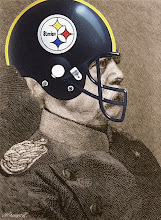The notion of biased media in this country is hardly anything new. There is media bias on “the right” (which, in this country, means the Republican National Committee with no regard to actual political philosophy) and on the “the left” (which, like “the right,” really means what the Democratic National Committee states is “liberal” without any consistent philosophical underpinnings).
None of this is particularly new. Americans accept biased journalism the same way we accept the idea that all politicians lie to get elected and do anything to get re-elected. Sadly, because most Americans accept the inevitability of biased journalism, they simplemindedly gravitate to those sources that merely reaffirm their preconceived notions. We, as Americans, don’t really want to have to think about important issues. Rather, we would rather be spoon fed the same ideas that have comforted (or discomforted) us for years. Perhaps the pandering to set audiences is a result of the efforts by both print media and television media to save themselves as their readership and viewership sharply declines. This policy is a last-ditch effort to maintain the customers they still enjoy.
This distortion of the truth is particularly disturbing to me as a historian. I frequently rely on newspapers as primary documents for my research. The stories and even the editorials of 19th-century newspapers provide me with insights into that time period. In the past, apart from the “Yellow Press,” there was a distinction between editorials and news reporting. That distinction, even in the most prestigious newspapers in this country, no longer exists. This tendency to editorialize the news is part of the media’s efforts to maintain their same customers.
I worry about the ability of future historians to make reasonable conclusions about their past. For example, two recent discussions of Barack Obama’s meetings with Nikolas Sarkozy, president of France, paint divergent pictures of their relationship. According to Jennifer Loven, the Associated Press White House correspondent, in “Obama meets Sarkozy; pay tribute to D-Day fallen,” “While France and the United States clearly have their differences, the relationship that turned frosty under George W. Bush largely because of the Iraq war has seemed to thaw some with Sarkozy and Obama at the helm of their respective countries. Both have expressed fondness for each other.” [italics added] We, and future historians, have a picture of two world leaders on good, if not outright friendly, terms.
However, reporting on the same event, Charles Bremner, writing in The Times of London in an article entitled, “Barack and Michelle Obama decline dinner with the Sarkozys” has a very different appraisal of the relationship between Obama and Sarkozy. He writes, “Mr Obama’s irritation with his French counterpart [italics added] began when Mr Sarkozy tried to grab the limelight at the G20 summit in London in April and talked condescendingly of the US President in private. Mr Sarkozy told colleagues that he found Mr Obama to be inexperienced and unbriefed, especially on climate change. Mr Obama hit back last month, telling a visiting French minister: ‘Please tell Nicolas that I shall do my homework, and in two months I’ll know all about climate change.’”
Admittedly, personal diplomacy, like the belief in the perfectibility of humankind, died in the trenches of World War I (the efforts of Ronald Reagan and Mikhail Gorbachev at Reykjavik notwithstanding). Therefore, it’s not a question of whether or not Obama’s and Sarkozy’s relationship will affect their ability to work out diplomatic or foreign policy goals together. Like every other important decision in the world, such issues are worked out by unelected bureaucrats. However, there are certain tendencies. President George Bush and Sarkozy, because of their dislike for one another, did not tend to guide their respective foreign offices to cooperate with the other side. When future historians attempt to interpret the diplomatic interactions between the US and France under the Obama presidency, which one of the two very different analyses of their relationship will they use to make their own analysis? Which of the two competing representations of the relationship between Obama and Sarkozy is closer to the truth? The goal of all historians worthy of the name is the discovery of the truth, no matter how illusive or unattainable. Thus, biased journalism distorts the truth now and forever.
Subscribe to:
Post Comments (Atom)

1 comment:
It is interesting that the counter view is from a non-us paper. A friend of mine live in Belgium for several years told me that for the most part, Europe (and I'm making a gernaralization here) did not hold the U.S. in as much low regard as our newpapers would lead us to believe. So much went on that we never knew about that during the first gulf war, her father would contact her from the states to find out what was really going on.
Post a Comment